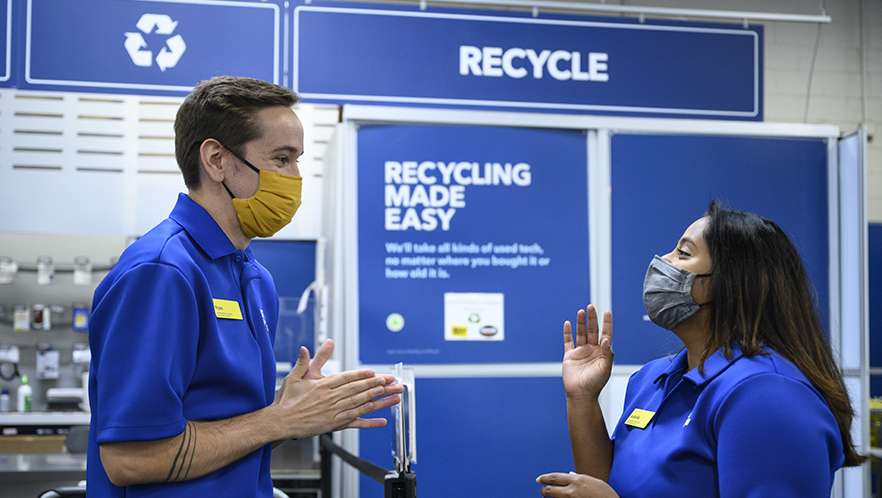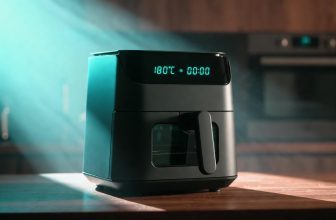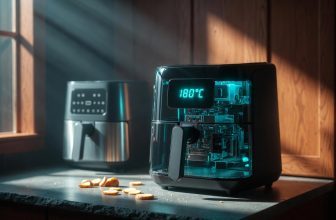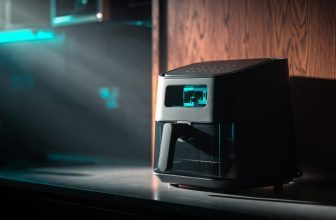As an Amazon Associate I earn from qualifying purchases.
Does Best Buy Recycle Air Fryers?
Does Best Buy Recycle Air Fryers? In an age where sustainability is becoming a critical focus, you might be curious about how major retailers contribute to the effort. Best Buy has taken significant strides in promoting environmental responsibility by offering various recycling programs. This raises an intriguing question: Does Best Buy recycle air fryers, one of the most popular kitchen appliances today?
Best Buy does provide a comprehensive recycling program for many electronic and household items, but it is essential to check specific details for smaller appliances like air fryers. According to their website, Best Buy has recycled over 2 billion pounds of electronics and appliances. Given this impressive statistic, the company appears committed to reducing electronic waste, making it a reliable option for eco-conscious consumers.

Does Best Buy Recycle Air Fryers?
Best Buy does offer a comprehensive recycling program for electronics, but it’s important to note that they have specific guidelines for each item. While they do accept many large and small appliances, air fryers fall into a category that might not be accepted at every location. Customers should check with their local Best Buy to see if they accept air fryers. Recycling programs can be different depending on the store, so it’s always a good idea to call ahead. This ensures you don’t make an unnecessary trip.
The electronics recycling program at Best Buy is significant. They have recycled millions of pounds of electronics, making them a leader in recycling efforts. However, the decision about what can be recycled often depends on local regulations and store capabilities. By checking online or contacting a local store, consumers can find out whether their air fryer can be accepted. This awareness helps prevent electronic waste from ending up in landfills.
List of common items accepted at Best Buy for recycling:
- Televisions
- Computers
- Small electronics like phones and tablets
- Large appliances with some restrictions
- Certain cables and wires
Recycling electronics is crucial for the environment as it helps reduce waste and conserve resources. By handing over old gadgets, consumers contribute to this effort. Best Buy’s initiative not only provides a safe way to dispose of unwanted devices but also raises awareness. People learn about the importance of recycling as they engage with these programs. This makes them more environmentally conscious in future purchases and disposals.
Overview of the Recycling Program at Best Buy
Best Buy’s recycling program is one of the largest e-waste initiatives in the United States. They aim to reduce electronic waste by accepting old electronics and appliances from consumers. This program is free for most items, and you don’t even need to purchase a new product to recycle. Best Buy promotes easy access by offering drop-off locations at most of their stores. This widespread network encourages more people to dispose of their electronics responsibly.
The company allows for the recycling of a wide range of items, making it a convenient option for many. Commonly accepted items include TVs, computers, cell phones, and various small appliances. For larger items like refrigerators, Best Buy often charges a small fee. The program doesn’t only involve drop-off; sometimes, they also offer pickup services for larger electronics. This enhanced accessibility makes recycling simpler for customers.
Services offered in the Best Buy recycling program:
- Free in-store drop-off for most items
- Pickup services for large appliances
- Special recycling events at community locations
- Guidelines for responsible electronics disposal
In addition to collecting old equipment, Best Buy also educates consumers on how to recycle responsibly. They provide detailed information about what can and cannot be recycled. This helps avoid issues when consumers bring in items that aren’t accepted. Their website offers tips and guidelines to inform customers. It serves as a helpful resource for anyone looking to make a positive environmental impact.
Significance of Electronics Recycling
Electronics recycling plays a crucial role in preserving our environment. E-waste contains harmful substances like mercury and lead, which can pollute the soil and water if not disposed of properly. By recycling electronics, we keep these toxic materials out of landfills. This process helps reduce pollution and protect public health. Not only does it benefit the environment, but it also conserves valuable resources.
Recycling electronics is more than just disposing of old gadgets. It involves reclaiming valuable materials like gold, silver, and copper. These materials can be reused in new products, reducing the need for mining and conserving natural resources. This reduces the demand for raw materials and minimizes environmental damage. Recycling also helps save energy, as manufacturing products from recycled materials consumes less energy.
Benefits of electronics recycling:
- Reduces environmental pollution
- Conserves natural resources
- Saves energy
- Prevents hazardous materials from reaching landfills
- Creates jobs in the recycling industry
The significance of electronics recycling extends to economic growth. The recycling industry creates jobs related to collection, processing, and selling recycled materials. Additionally, it fosters innovation as companies develop new technologies for handling e-waste. Public awareness campaigns about e-waste recycling also contribute to educated consumer choices. This leads to a more sustainable society overall.
Procedure for Recycling Electronics at Best Buy
Recycling electronics at Best Buy is a straightforward process. First, gather your old or unwanted electronic devices that you want to recycle. Make sure to check Best Buy’s website for a list of accepted items to avoid any surprises. Once you’ve confirmed your items are eligible, you can head to your local Best Buy store. They usually have a designated area for recycling drop-offs.
Upon arriving at the store, locate the customer service desk or the recycling station. If you’re unsure about where to go, any staff member can direct you. Best Buy accepts many items for free, but some larger appliances might incur a small fee. Make sure to ask if there are any charges for the items you’re dropping off. This ensures a smooth and hassle-free process.
For larger items like TVs or refrigerators, Best Buy offers a pickup service. You can schedule this service either online or by calling their customer service. The pickup service might come with a fee, but it offers the convenience of not having to transport bulky items yourself. This is particularly useful for people without the means to move large electronics. Best Buy makes the entire process easy and efficient.
Things to remember while using Best Buy’s recycling services:
- Check the list of accepted items before your visit
- Ensure data-sensitive electronics are wiped clean
- Ask if there are any fees for specific items
- Consider scheduling a pickup for larger items
In addition to in-store drop-offs, Best Buy sometimes hosts special recycling events. During these events, they accept a wider range of items and often offer additional services. Keep an eye on their website or sign up for newsletters to stay informed. These events can be a great opportunity to recycle items that might not be accepted regularly. They also help raise awareness about the importance of e-waste recycling.
The Environmental Impact of Best Buy’s Recycling Program
Best Buy’s recycling program significantly benefits the environment by reducing electronic waste. With millions of electronics being discarded each year, e-waste can become a severe problem. By recycling these items, Best Buy helps to prevent harmful materials from contaminating landfills. This practice not only manages waste but also protects the ecosystem. Their efforts make a positive difference in local communities and the planet.
This program also aids in conserving valuable resources. Electronics contain materials like copper, gold, and silver. By recycling, these materials can be reclaimed and reused in new products. This reduces the need for mining, which often causes environmental damage. Recycling allows us to make the most of the resources already available, reducing the strain on the Earth.
Table of materials commonly reclaimed through recycling:
| Material | Usage |
|---|---|
| Copper | Wiring, electrical components |
| Gold | Electronic connectors, devices |
| Silver | Conductors, switches |
More than just waste reduction, Best Buy’s program promotes energy conservation. Manufacturing new products from raw materials consumes a lot of energy. However, using recycled materials significantly cuts down energy use. This leads to reduced carbon emissions, positively impacting climate change. The program, therefore, contributes to a greener future.
Best Buy’s commitment extends beyond just recycling. They also raise awareness about e-waste and promote responsible disposal methods. Their initiatives encourage other companies and consumers to adopt sustainable practices. By setting an example, Best Buy fosters a culture of environmental responsibility. This collective effort makes the program even more impactful.
Frequently Asked Questions
Here are some common questions related to Best Buy’s electronics recycling program. These answers provide clarity and details to help you understand their services better.
1. What types of electronics does Best Buy accept for recycling?
Best Buy accepts a wide range of electronics for recycling, including old TVs, computers, cell phones, and various small appliances. They also take large appliances like refrigerators and washing machines but may charge a small fee for these items.
Their comprehensive program aims to make it easy for consumers to dispose of unwanted electronics responsibly. You should check their website or call your local store to confirm which items are accepted.
2. Is there a fee for dropping off items at Best Buy’s recycling program?
For most smaller electronic items, the drop-off service is free of charge at Best Buy stores. However, larger items like TVs over 50 inches or major appliances might incur a nominal fee.
This minor cost helps cover the handling and processing expenses associated with large electronic waste. It’s advisable to check the specific fees online or at your local store before bringing in your items.
3. Does Best Buy offer pickup services for e-waste recycling?
Yes, Best Buy offers pickup services for larger electronics and appliances that are too bulky for easy transport. This service is convenient but usually involves a fee based on the size and type of item being collected.
You can schedule a pickup either through their website or by calling customer service. This option ensures that even large, heavy electronics can be responsibly recycled without causing you extra hassle.
4. Can I recycle my old printer ink cartridges at Best Buy?
Yes, Best Buy accepts used printer ink cartridges as part of their recycling program. Recycling these cartridges helps keep harmful chemicals out of landfills and contributes to resource conservation by allowing parts to be reused.
You can conveniently drop off empty cartridges at any participating store location during business hours. Some locations may also offer incentives or rewards programs for returning these items regularly.
5. How does Best Buy handle data security on recycled devices?
Best Buy strongly advises customers to wipe all personal data from electronic devices before bringing them in for recycling. While they do take steps to ensure proper data destruction, it’s ultimately the customer’s responsibility to safeguard their information.
This practice ensures your sensitive data doesn’t fall into the wrong hands once the device has been handed over for disposal. Detailed instructions on how to clear data from different devices are available on their website.
Conclusion
In summary, Best Buy’s recycling program offers a valuable service for responsibly disposing of unwanted electronics. Their efforts significantly reduce environmental impact and promote sustainability. By participating, consumers can help conserve resources and minimize e-waste.
Whether you’re recycling small gadgets or large appliances, Best Buy makes the process straightforward and accessible. Their commitment to environmental responsibility sets a strong example. It’s a practical, eco-friendly solution that benefits everyone.

Maksuda Khanam is a passionate home appliance expert and the primary author behind KitchenMarts.com






